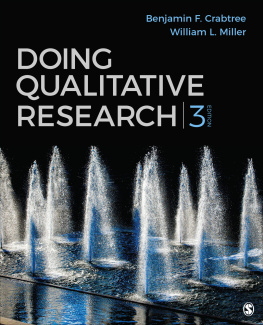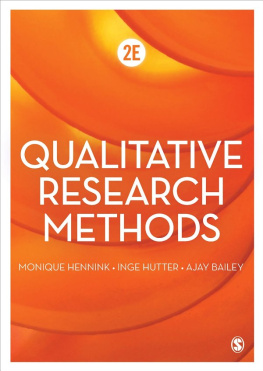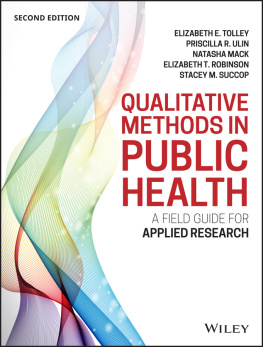We would like to thank our students, who are the central focus for us as scholars. Special thanks to Mr. Brien Cummings and the staff at SLACK Incorporated for their belief in this expanded edition and for their guidance and support.
W. A. Pitney, J. Parker, S. Mazerolle Singe, and K. Potteiger
Special thanks to Paul Ilsley for showing me the value of qualitative research. Im thankful for my family, who always puts a smile on my face. To my co-authors, thank you for being great colleagues and always willing to listen, share, explore, and write.
W. A. Pitney
Thanks to Judy P., Larry, Patt, and Judy M. for providing me with such a great start to my qualitative voyage.
To my co-authors, thank you for sharing your vision, time, and expertise; it has been my pleasure to be part of this team. And finally, I thank the people whose love and encouragement know no bounds: my family and friends on both sides of the Atlantic; I could not have made this journey without you.
J. Parker
To Bill Pitney, thank you for seeing my potential and sharing your wisdom and empowering me to succeed. To my past and current students, who have the same passion for qualitative research, thank you for being a sounding board and champions for the qualitative research paradigm. To my sons, Camden and Beckett, you are my everything, and I am blessed to be your mom. To my husband, Tony, you are my true north, and I appreciate all of your support, encouragement, and unconditional love, which inspire me to reach great heights. Mom and Dad, thank you for believing in me from day one.
S. Mazerolle Singe
Thank you to my co-author, Bill Pitney, for teaching me the ways of qualitative inquiry. And a special thanks to AJP and JAP who are my JAM.
K. Potteiger
PART ONE
Chapter 1
- b
- c
- b
- a
- d
- d
Chapter 2
- e
- b
- a
- c
- b
- b
- e
PART TWO
Chapter 3
- b
- e
- a
- a
- c
- b
Chapter 4
- a
- b
- c
- a
- c
Chapter 5
- b
- a
- d
- e
- d
Chapter 6
- b
- c
- d
- b
- f
PART THREE
Chapter 7
- a
- c
- a
- b
- b
- a
- d
- c
Chapter 8
- a
- c
- a
- d
- a
- d
Chapter 9
- a
- d
- b
- b
- a
- d
Chapter 10
- b
- a
- c
- c
- a
Chapter 11
- a
- a
- a
- b
- a
Dr. Christianne M. Eason has no financial or proprietary interest in the materials presented herein.
Dr. Jenny Parker has no financial or proprietary interest in the materials presented herein.
Dr. William A. Pitney has no financial or proprietary interest in the materials presented herein.
Dr. Stephanie Mazerolle Singe has no financial or proprietary interest in the materials presented herein.
Dr. Kelly Potteiger has no financial or proprietary interest in the materials presented herein.
LEARNING OBJECTIVES
Readers will be able to do the following:
- Describe the nature of research.
- Define qualitative inquiry.
- Identify and describe the attributes of qualitative inquiry.
- Compare and contrast qualitative and quantitative research.
THE NATURE OF RESEARCH
Though this text focuses explicitly on qualitative inquiry, we must first define the term research to provide a context for the discussion. Research is viewed in many ways. Practically, it denotes the process of gathering information to find a solution to an identified problem or answer a specific question.sophisticated and scientific research process is used for complex problems and for professional inquiry.
This broader definition explains the key tenets of research for professionals. Research is a systematic way of collecting and analyzing information to answer a specific question and to add to a disciplines knowledge base. Indeed, it is a way to systematically investigate the effects of various interventions, a topic, phenomenon, issue, or problem of interest for greater understanding.
The first tenet is the systematic nature of research. Researchers follow specific steps to solve problems, including collecting appropriate data, analyzing that information, and drawing reasonable conclusions from it. Scholars often question how the information gained from a study lends to their overall understanding of a topic. The second tenet is that research advances the understanding of a specific discipline or significantly relates to an area of study. Although these 2 tenets are appropriate for every form of research, the methods differ for quantitative and qualitative inquiry.
QUANTITATIVE AND QUALITATIVE INQUIRY
Quantitative inquiry, also referred to as traditional or conventional research,
Quantitative Research
Many health care professionals use quantitative research to analyze numerical data, including heart rate (measured in beats per minute), blood pressure (measured in mm Hg), and blood-sodium level (measured in mmol/L). Quantitative researchers answer questions by identifying variables, measuring them, and examining how they relate to one another, or how one variable affects another. When examining the relationship between exercise intensity and blood pressure, for example, researchers may ask whether a treatment or intervention causes a specific outcome or whether a cause-and-effect relationship exists between the 2 variables. In this example, exercise lowers blood pressure (specific outcome), and long periods of exercise dilute blood-sodium levels if participants intake of sodium and water does not match their output of sweat (cause and effect).
Qualitative Research
Although quantitative research is important and necessary, many aspects of professional and personal lives cannot be explained with numbers. As Austin and Sutton point out, much of a health professionals work occurs in a social, clinical, or interpersonal context where statistical procedures and numeric data may be insufficient to capture how patients and health care professionals feel about patients care. Qualitative research is helpful in these instances.
Qualitative research is described as a form of social inquiry whereby a researcher seeks to understand human behavior, particularly the meaning that people give to an experience.
Researchers in the health professions have used qualitative methods for more than 30 years to expand their methodological base and to broaden their understanding of human behavior. believe one reason for this skepticism is that quantitative researchers misunderstand the process, purpose, and products of qualitative research. Thus, a look at the common attributes is warranted in this introductory chapter.

Are quantitative and qualitative research mutually exclusive?
No. Some research problems lend themselves to investigation with both methodologies.
ATTRIBUTES OF QUALITATIVE RESEARCH
Many unique attributes differentiate qualitative research from conventional, quantitative research. Numerous researchers have described it in terms of its characteristics, This section identifies the unique qualities of qualitative research and compares and contrasts them with quantitative research.
Next page









